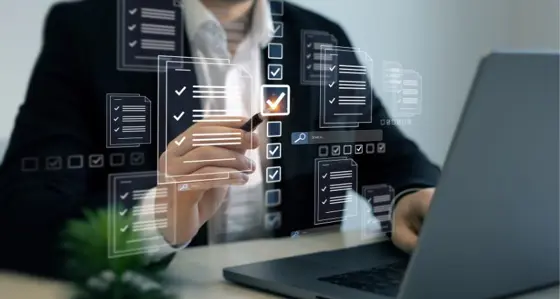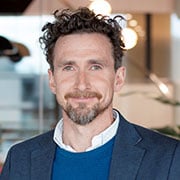Mansi: Hello, everybody, and welcome to the next episode of our podcast, The Rise of the COO. Welcoming Chief Operating Officers, subject matter experts and industry experts from across our clients and bringing guests to engage and discuss topics that matter to COOs in today's world. My name is Mansi Patel and I'm our capability sector lead at Baringa as well as our COO network sponsor. In this podcast series, we continue to explore some of the greatest challenges and opportunities for COOs over the next couple of years. We'll share insight into how COOs are approaching these and the experiences and learnings they're having along the way. Today's episode focuses on mastering the modern COO role with a focus on risk data, communications and the power of A.I., all whilst also exploring the qualities that make a COO truly successful in today's world. We have with us today Paul Rayson, Markets Chief Operating Officer at Citi. Welcome, Paul and Pete Shannon, an expert in our digital team at Baringa. Paul, why don't you introduce yourself?
Paul: Thank you, Mansi. Hi. Yes, I'm Paul Rayson. It’s a pleasure to be here with you both today. And she said, yes, I’m the chief operating officer for markets at city. Markets is a big business of Citigroup. We've got presence in about 80countries and distribute provide sales and trading capability and underwriting for asset classes like commodities, equities rates and things. So we're a big business and it's great to be here with you today.
Mansi: Great. Thank you. Really looking forward to our conversation today. Pete, why don't you introduce yourself?
Pete: Hello. Both great to be here. And yeah, I'm Pete Shannon. I lead AI for TMT specifically at Baringa. I've got about 25 years digital and tech delivery experience that's building and leading teams at corporates, scale ups and in consulting. And previously I co-founded and was COO of an AI tech CX company where I was leading the strategy, the engineering, the product teams for automatic resolution of customer inbound inquiries.
Mansi: Brilliant. Ourfocus today is on data and AI and considering your role within Citi, be great to perhaps start at the macro level and just hear a little bit about what is the wave of change that you see coming your way as the COO?
Paul: Yeah. Thank you and see what changed throughout actually my whole career has been a constant one, but certainly feels like we're going through a really rapid pace of that at the moment. Certainly the change on data from simply just being focused on having good data quality so we could do the reporting and things that we needed to out. And now really seeing data as an asset that's critical to our to our business and being able to use that. So that really impacts all things that we do is huge in terms of our client franchise, the way that we operate the business, but particularly in the area I'm focused on a lot of my time at the moment is in our risk management and control. It's been pivotal and we've really found over the last few years that we're really investing time in the quality and the completeness of data we've got. We're actually able to do a lot more things. We can probably get into some of them as we get through the discussion today. But for example, you know, we've now got way more automated controls, preventative controls to stop bad things happening where previously that would have been manual human efforts. It's really, really change. But I have to say it's taken a lot of effort and time actually in terms of getting the data right so that we can use it right.
Mansi: And lots of organizations clearly have people focused on risk compliance controls, but it's not always the thing people want to talk about. But just with the rise and focus on data, some of the risks or concerns around AI that’s become very prominent in the boardroom is that discussion. Be good just to hear a little bit about how that has become topical in your business in a different way? How has it been driving that forward? Created a different dialog around it?
Paul: Yeah, I think firstly, just to take the first part of your question really around the sort of risk and control, which is typically probably not the sexiest thing that people want to want to talk about, but it was a great example I heard and an analogy that sticks with me, which is if you want to drive a racing car really fast, you need to have good brakes and that really, you know, risk controls are the brakes. And so the better the risk and control capability we have, the faster we can drive our car, the more profitable our business will be. So that that's really the sort of backdrop of it. But what we've certainly found in terms of our ability to analyze and measure risk and a lot of the risk that I look at is operational risk or compliance risk. For us, wee're very heavily regulated. There's a lot of emphasis on making sure that we're compliant with all the relevant laws, rules, regs is using data to do that quickly. So an example might be someone wants to enter into a particular transaction, they need to be authorized. And you know, what we can now do is essentially use that transaction data reference to the data about that permission being run and control that's automated. And if they're allowed to do something, they can do it. And if they're not allowed to get prevented previously, probably there might be in some paperwork, some order done to them and some time after the fact, we would have found out that someone did something that they weren't there to do. So the use of data there has allowed us to move that forward. Turning particularly to AI, what we're certainly seeing in I'd say the earlier phases I think we're in now is really the use of AI to help augment what we're doing. So an example, you know, kind of moment I mentioned about compliance risk is using A.I. to help us interpret laws, rules and regulations. The A.I. one can actually help us sort of strip out what the actual requirement is from what's written. And secondly, once you've done that, she then help us define what's the control that we need to enable that regulation or manage their risks. So that's one that's, you know, certainly we are on a number of firms are sort of actively working on that. But I think, you know, really helping us essentially hunt for risk, hunt for what could happen. And it definitely is It is a whole raft of uses cases there.
Mansi: And making it really accessible as well through quickly getting to the requirements. Great. And just whilst we're on the theme of data and IP, you have this well mantra just around perfection is the enemy of progress when it comes to data, what is required across their estate in this more data driven well that we operate in, but also what's required for ROI.
Pete: Yeah, sure. I think that yes, perfection is the enemy of progress, but in certain contexts you need to at least have that as the North Star across a lot of your data estate. I think it's really horses for courses. You need to look at where there are particular applications of either machine learning or standard statistical analysis or even AI. And what is the outcome from that? If it's high risk, then perhaps you need to have high controls in terms of the data, if it's low risk and potentially if there was disruption or perhaps a moral degradation, it wouldn't necessarily matter. Then you need to sort of approach data and the quality of it appropriately. And in that instance, I know that I'm. Paul Probably from your perspective, there are audit functions that would prefer perfection in data across the board. And I think that's a fight and a conversation that needs to take place, not just in the banking sector, but across the board.
Mansi: Yeah, I couldn't agree more. And let's touch a little bit on how your teams are embracing this change. So you mentioned Citi is a very regulated environment. So naturally there will be some affinity to wanting to have the right data in place, the right controls in place, given the compliance and regulated nature. But how have your team in particular under the COO function, embraced this very kind of fast approaching generative A.I. landscape that they're now faced into as well?
Paul: I put in a number of ways, I think, you know, thinking about this A.I., which is now on us, it's probably been, I don't know, 12- 18 months since it sort of burst onto the scene,. And I was thinking back a little bit about kind of the last tech drop like that I can recall, which is sort of blockchain where we seem to recall then, you know, lots of training explaining what blockchain was. And I think probably after 3 or 4 of those, I probably wasn't that much clearer as to what it was either verses with large language models or, you know, Gen AI literally it's available on your mobile app and you can use it instantly. And whether that's a child or a grandparent, it's super accessible. So one thing that's really helped in terms of the sort of workplaces is people are using it outside of work. And so therefore that sort of learning and idea creation is I think, much quicker. Some of things that we've done is to make available we call a sort of sandbox, a safe space where A.I. tools are available. People can experiment, pilot different things and basically allow people to learn and explore what's possible. And out of that I'm sure will come some really good, good ideas and things that will sort of, you know, take forward and part of the way that we run our business. But it's been certainly something, I think, where we've seen a high sign up rate of people who are just, you know, keen to get involved, learn more. But the big difference I really see with AI is just so much more accessible to everyone. And it's not just in the workplace, it's in your whole life.
Pete: And I think it's definitely got the subject on sort of people's horizons and on that on their radar. But I think it must have data science teams and data science professionals pulling their hair out because now people are talking about in this very broad, sweeping time, we're actually I've always been in existence for a long time. I think we all recognize that. I think when people are talking about A.I. now and the kind of risks and dangers of the use of that and the degradation of those models, they're talking very specifically about AI Gen Iwithout knowing it, they're not necessarily talking about the more sort of machine learning potentially moving into deep learning, but not the generative A.I. side of things. And I think there's different applications and I think there's different risk models associated, for instance, across multiple sectors. If you've got a lot of unstructured data, it can be very useful in terms of summarizing that and presenting information and actually creating new data. But what you might not want to do is rely on that potentially for a transaction as a way of trying to find out for what you might be wanting to use much more specific machine learning capabilities. And that's where I think that there's a lack of knowledge across the board.
Paul: Definitely. I think certainly if, you know, if I don't know and I think back to sort of the initial burst of ideas that came through would be very much around I, you know, I could have gone and got a client they want to do something like. They can then tell the sort of client what they should do. And it's then really morphed as we've got better understanding of the risks and the capabilities. Well, actually, maybe a better place to start in that kind of example is actually could we get a large language model or eye to basic scan, look at all the research out there and put together some ideas that could maybe augment a human salesperson as they're talking with the client. Now, you could then see over time that may well evolve to a different generation of behavior. But certainly what we've seen from the sort of initial allies is going to do the whole thing. Actually, as we've got more into our implementation, it actually looks more like how it'll augment a human to do something and it'll make that human more, much quicker and efficient about doing that thing.
Mansi: Great point, Paul. And are there any ideas you're seeing in other industries from an AI perspective that you could bring into banking now?
Paul: I think certainly within banking, I'd say as an industry, we talk to each other quite a lot, but we're quite insular actually, certainly Mansi here as well. What's been great actually has been the sort of partnership with Baringa around our network is the opportunity to me, a mix with COOs from other industries and that's been an enlightening one in terms of the different challenges that people face, but also how similar the problems are, whether it's around data or culture. And, you know, one of my things work is generally, you know, trying to keep calm and sort of manage through problems. And probably one of the sort of stock phrases I might say to myself is it's fine because yet no one's going to die. Well, actually, in some of those other industries, people could die. And actually and so it's quite mind blowing actually. That's almost that sort of level of a responsibility that people have in different businesses. You know, ours is really more around, you know, making sure that we're compliant and we do the right thing. But separately, lives aren't at risk, whereas others, others definitely have.
Mansi: And we've had a few of those stories, haven't we, through that COO network that were quite eye opening to the collective group. And I think it's really nice. I think what you've said that there is a real draw of, how do you share some of that across that network that has really come to life through it as well? And one of the things that we touch on frequently with them is, you know, the leadership role that you play as the COO. So maybe we'll move on to a little bit of that. It was really interesting to hear the curiosity in your team around playing with new tools, playing with data. And I lots of people are experiencing some of that. But then your role as COO and being able to really communicate some of these changes across the business, get people on board. He might not be as curious as they are in your team, but more broadly across the business. How do you do that? How do you broadcast things that are required for the organization, but also make sure that it is received well?
Paul: So certainly in my job as the COO, one of the things you get involved in is kind of involved in most aspects of the business, but essentially it's the sort of corporate comms and how do we communicate with our employees. So certainly is something we've really focused on. One is to let our employees know that we're doing something, we're active, and it's a thing because that's what they're hearing from their friends and peers at other companies. So there's an element of making sure that we appear relevant. But more important than that, actually, then as I mentioned before, about giving them all opportunities to actually get involved and that doesn't need to be everyone. I think, you know, it's we've got people who are great at starting and innovating. We've got very yeah, people are very good about thinking about the risks of stuff. So not everyone needs to be involved. But certainly what we do want to do is to make sure that if anyone who does, there's the opportunity to do that. So we've done, whether it's through, you know, various sort of group meetings or town halls with, you know, big groups of staff sort of talking about here's some examples of things we've done. This is how you get involved. Quite simple really, but just essentially making it available. And certainly I think we been used, I think a little bit. You know, when I started at work for a long, you know, a long time, you were, I would say typically the tech that you had at work was better than the tech that you had at home. And that, I think over the years has probably pivoted a little bit. And so with this, I think it's an opportunity for us to actually move very quickly within the workplace so that we actually, you know, we're on leading edge or all the latest, latest stuff. Whereas I think there's a there was a period over a few years where I think generally industry, but certainly banks were, I think probably behind in terms of what was available.
Mansi: And one of the key things that everybody faces into all the time is just how much is thrown at you. And I know one of the things that you're quite passionate about is how to keep things really simple and good. Just to hear a little bit about that, because I know you've thought long and hard about this. There's a mechanism for communication and how to land things. Yeah.
Paul: And funny, it's probably the almost the sort of polar opposite of the AI side of things that some of the tools actually can help. But you don't have a real passion for trying to simplify the way that people communicate in writing. I would say it's a sort of passion, probably so. So my colleagues might say it's more of an obsession maybe, but what I certainly become aware of and all of us in the workplace right from the sort of entry level up to board level, we're all short of time or attention. Sure. I don't know about you, but if I receive a long, you know, a long email and it's not obvious, I'll park that and I'll move on to something that's easier to do.
Mansi: Yes, I do this all the time.
Paul: Yeah. And so and certainly what I observe is when, particularly in our personal lives, where we're quite casual in how we communicate using most messaging or WhatsApp, we're short, sharp, straight to the point. And so how we communicate may be a bit too informal at times, but it's very punchy. Whereas in the workplace, when you see presentations or reports, people communicate the same thing, but all of a sudden it becomes verbose. It's full of acronyms. And so really to, you know, try and sort of focus that down. So I actually spend not a huge amount time, but a reasonable amount of time coaching in this area is probably a few things I sort of focus on a bit. One is sort of making sure that you get to the point. So make it easy for people to know what you want to do. There's an old saying that sort of less is more. The way that comes to life, I think is, you know, if you've got three really persuasive points to make, if you then add in three less persuasive points to make six points, the three less persuasive take away from the three good ones. And so actually, your argument is weakened by having six points versus just having three. So that's sort of one. One element is really getting to the point using plain language. I'd much rather use the word use rather than leverage. Yeah, but people think they're smarter somehow if they've leverage something.
Mansi: And have you leveraged A.I.?
Paul: Yeah, exactly. Another one. The real bugbear of mine is the number of times you say at the top of a presentation. Here's the key highlights. It's like something's either key or is a highlight, but it's probably not a key highlight and really small things. But it's all it just becomes part of the Corp corporate culture. So one of the things I do quite regularly is if you see something that I think is a bit long, it's just say to someone That's great, really good like that, but can you go away and reduce the word count by 20 to 30%? And invariably they're always able to do that and it comes back better. And I think that really is there as this old phrase, if I had had more time on a written you a shorter letter and it's really that it's that last bit it's the investment of time to really find down what it is that you want to do. And I think probably the link back to, you know, some of the sort of tools that are that are available now just in Microsoft, three, six, five. If you go into the to the review tab in word or email or whatever else, there's tools there that will analyze what you've written, tell you whether it's formal, casual, give you said suggestions on how to simplify what's written to these tools and maybe capabilities that that help do this. And I think that will only grow in this particular space. I'm sure AI is going to rapidly or large language models rapidly transform the way that we with our written communication, without a doubt.
Mansi: I think that really is the opportunity and there are some wonderful nuggets in there just for any of our listeners to really think about applying actually into their own organization. So thank you for that. I might just switch a moment, Pete, and say, What are you seeing in terms of how A.I. is transforming communications across our client organizations and the tools out there? Any thoughts?
Pete: Well, I think from the COO role perspective, I mean, in previous conversations we've had, Paul, you've talked about the fact that your role is very much in joining the dots and being able to make decisions because you've got view across all of these different data points. And effectively it's similar to the way we want to have artificial intelligence work across the entire organization in those particular control measures or whatever that might be. And I feel that as we progress the ability for you to assimilate all of that verbosity coming up through the ranks to you will be potentially simplified on the receive side as well as on the supply side. So I think that those tools that you're talking about, yes, currently you are able to access some of them and the simple terms in three, six, five and the copilots that are out there and so on, I think that will be very soon a wave of tooling that comes through to enable that assimilation of data to happen much more quickly, to be able to effectively have those virtual assistants provide you the key summaries of the points that are in place. Now. The challenge that we've got at the moment with Gen II is the fact that it almost treats all inputs the same and both within the way we've been talking about it operationally within the banks, but also in terms of that information that you're going to be getting from the members of teams that want to be telling you stuff, it's going to be the same challenge. You're going to have those three key points and the three other points. And I think that that's where the nuance is going to play. Yes, there's tools that are out there currently that assist in summarizing, but as we progress, there's going to be far more information that we understand from source and from what you require to be able to really cut that down to enable you to be more efficient and to be a more efficient CEO.
Mansi: Thanks, Pete. Great to hear some of those answers and what you're doing. Paul, in the space of data and AI within Citi, and particularly within your role, talking about your role, I know a number of our own COOs from the network will be listening as well as others. I guess I had a question for you, which is what is the job as a COO? You believe you and only you can do?
Paul: Great question, Mansi And I'm not sure there is necessarily a sort of singular answer to that.
Mansi: I didn't expect that.
Paul: But I think, you know, I think if I think about what are some of the good, in my view, characteristics of a COO you mentioned already. But really one of the things is around the ability to connect the dots. There is within a business, the CEO, the CFO, maybe the CIO. There's a handful of people really across the whole of the business. So the ability to connect up and particularly, you know, for a job like mine, as I mentioned, I'm the COO for markets. Markets is a very big bit, but is part of a bigger enterprise as well. So actually that connection as well into the broader and enterprise or even as you mentioned earlier in industry or other industries is also something I think that's sort of connecting the dots. Ultimately, a big part of the job I think is around solving problems and delivery. And yet one of the things I certainly focus on is kind of being calm under pressure and sort of that steadfast leadership for peers and sort of teams. If there's you know, it's like if things are really bad, there's someone there. It's like, okay, so it's okay, no panic. We can figure this out. And that certainly I feel is a big part of my job. Is that sort of just, okay, let's just calm things down and we can work this out. And so there that comes from the ability to do that is actually built from a breadth of experience over a number of years. So I think if you see how, as you probably say, they've got various different backgrounds and done all sorts of different things, my background started in finance. I'm a qualified accounting. I worked in financial control for a number of years. I also worked in a strategy and planning job. I think that actually really helped with the COO job because that planning strategy role gave a sort of bird's eye view of the whole of a business, and I was able to sort of take that through. But also in my particular job, as well as a lot of focus around risk management and, and control and sort of understanding the risks inherent within a business. What can go wrong is really important. You've got essentially your lot. You've got a lot of hunters within a commercial enterprise, but you also need someone who's keeping an eye and making sure that the whole thing's safe.
Mansi: A great role to play in and in some of what you describe. Firstly, it's lovely to just hear your background and set of roles to this role. Given our podcast is the rise of the COO, you describe some really, I guess what I term the hardest skills they have or the core skills around delivery, around performance, all of those. But you also operate in what can be a boardroom full of multiple and different distinct personalities that you have to manage as someone who looks across the whole business. What do you think are some of the softer skills that have held you in great stead over the last couple of years in your role?
Paul: Yeah, I think the one constantly come back to is assuming positive intent. And so in every situation coming in, assuming that the person that you're dealing with has positive intent for what they're doing, there's a good reason why they want to do that. And if you don't agree on something to understand why that is, and then then you can then start untangling that problem and figuring out. So that to me is kind of one of my overriding principles in terms of the way that I operate. And then from that, oftentimes there's a degree of diplomacy and influence in the way that the role is done. Others may do it differently. I definitely hear stories of COOs being kind of the enforcer within a business, and that might be right for a particular business, but certainly within the environment that I'm in. You're part of a bigger organization. Diplomacy and influence. Taking the firm with you is a really important part of it.
Mansi: Great. I love that answer. And I can't help myself. I have to ask I love your point around positive intent. Has it ever not materialized in the answer that you want? Cheeky question, but I'll just read it in.
Paul: I think it's super rare you can have people come into your office or come and talk to you and they're complaining about someone or something and it's like that person didn't come into the office today to do a bad job or make your life difficult. They came in to do what they thought was their job, and if it's not connecting or it's not working out, we need to figure out why. Yeah. So I'd say very rarely, as you might see. Very rarely.
Mansi: Yes. And I love where you've gone to, which is a curiosity to ask why I think that's such a key trait, not just of actually our COOs, but actually all great leaders to really try and understand what's behind that, what's going on with that individual today. Because ultimately you do believe in the positive intent of them showing up to do a good job. I'm always fly's in these podcasts, so we're almost at our close. But it would be remiss of me not to ask if you were able to share a few words of advice to our listening audience today, Paul and Pete, perhaps starting with you, Paul.
Paul: Yes, thank you. It's a great question. As you were asking, I was trying to sort of think through and as you go back to the title about the sort of the rise of the COO, I think probably for people who are on their career journey. You mentioned just mentioned the word curious but being curious. And I think particularly as with the development of new tools and techniques, understanding how things work, I think is going to become much more important. When I started out, it was. Some people were successful because they could do things well. We're seeing that shift now. It's all about the understanding. So I think be curious and learn. And the other thing I would I would say and I've definitely been a beneficiary of this is to try different things, the sort of breadth of experiences you've got. You just, you know, piece example there from where he was sitting here in a consultancy, different experience, you know, founding. But all of those experiences come together to make you what you are.
Mansi: Yes, I couldn't agree more.
Pete: I think for me, I think it would be this transition from 2023 to what 2024 needs to be. It seemed to be in 2023. And before you had a knee jerk reaction where you led with a knee, whatever that meant. And I think that we are in a position now and it's something that we're seeing across all of our clients. Our client network is the fact that the realities kick in where we need to be a little bit more business outcome focused rather than this this new thing called A.I.. So one of the ways we're taking that to clients is considering our propositions, making sure that the strategic agenda is intelligent in terms of those business outcomes, but then working out where and how most appropriately, you can use artificial intelligence, machine learning, all the technical tools that you've got at your disposal to make the change and reach the goals that you've got.
Mansi: Right. Thanks, Pete. And as you've both said today, you know, I've been around for a while and actually it's been this recent burst onto the scene that's really accelerated attention to it. But some of the underlying things that you've both shared today around using data well, around being really curious about how to exploit that for the benefit of organizations as well as personal use, I think have been really important and it's been great to hear how you've brought that to life. Paul, for what that means for Citi in particular. Paul, Pete, it's been delightful having you in the studio with me today and insightful to hear from you both. So thank you for our listeners, thank you for tuning in and we're really looking forward to engaging with you in our next podcast episode.







